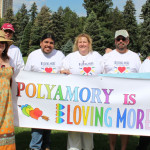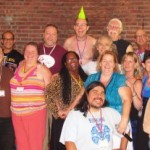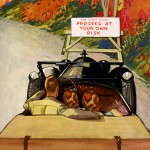By John Ullman
S has been gone for over eight years now. She died suddenly, a heart attack, at 61. Her death shocked our poly community, many of us being close to her age. We had lost another of us some years before, but it was an accident, a car wreck. Then we were stunned. But when S died, we were rudely made aware of our own mortality.
 Her wake brought together S’s bio family and her poly friends, many of whom were collaborators, lovers, long time friends who shared deep emotional bonds, trust, and high adventure. When we spoke, it was more about her virtues than the adventures, which would have curled some of her family members’ hair. A decade later, not a day goes by that I don’t think of S. And not a week goes by that she doesn’t come up in conversation. It is often a ribald story, but occasionally, at times of decision making, someone asks, “What would S do?
Her wake brought together S’s bio family and her poly friends, many of whom were collaborators, lovers, long time friends who shared deep emotional bonds, trust, and high adventure. When we spoke, it was more about her virtues than the adventures, which would have curled some of her family members’ hair. A decade later, not a day goes by that I don’t think of S. And not a week goes by that she doesn’t come up in conversation. It is often a ribald story, but occasionally, at times of decision making, someone asks, “What would S do?
Last year D passed away after battling Parkinson’s for over a decade. His partner, L, nursed him through his last, difficult, painful years. Parkinson’s ultimately took his mind, then his life, and all of their savings. Several of their poly lovers helped. They visited, gave D massages, and helped bring him to his medical appointments. Now they are helping L get resettled and hack through the inevitable details and red tape.
D’s wake was a subdued celebration of a life well spent. As twenty-five or so of us sat in the living room of a large poly home, L spoke some remembrances first, her trademark enigmatic smile on her face. Then we began remembering D’s virtues – his kindness, joy, and competence. Shyly, then with more energy, D’s lovers told how they valued their friendship with him, and by the way, wasn’t he just wonderful in bed, especially in the oral sex department. L’s smile broadened as we all found our laughter and our tears.
When the poly community began to coalesce in the 1980’s, we used to theorize about what it might be like for us when we got “old”. We saw many in our parents generation cast adrift by the loss of their life partner, having to suddenly shoulder his share of the load. At the same time, they had to learn a whole new set of skills if they wanted love and sex in their lives. Some simply assumed sex and love were over for them. We thought it would be different for us, and it has been. No one can replace another person of course, especially a life partner. But if one has other lovers, they can continue to meet the sex, relationship, and love needs of a surviving partner.
In the mono world, the death of a spouse may be the time when the deceased’s dirty laundry – affairs, mistresses, love children, etc – come to light, adding stress and grief to an already stressful situation. For polys, otherloves are part of the solution, not part of the problem. For polys, the intimate, if not sexual, relationships we have with our otherloves and our metamores add strength and trust to the circle we turn to in times of loss.
In the ’80’s much of our poly discussion was about “can it work in the long run?” Now that many of us are near the end of the “long run”, we are asking if we can find ways to enjoy the company of our dear friends, support each other as new health needs arise, and come up with good mnemonics to help us find where we left our condoms. Only a few of the polys I know have made the effort to establish group living situations. Most of us opted for the mainstream practice of living as isolated couples or singles. It is not clear if we can make the kind of changes we would like now, or even what options might work well. I hope that middle aged polys will think a little more about that than we did.
Those of us who have practiced polyamory through our lifetime must be grateful for the abundance of love in our lives. But having those wonderful otherloves means we must accept a little more grieving as well.







